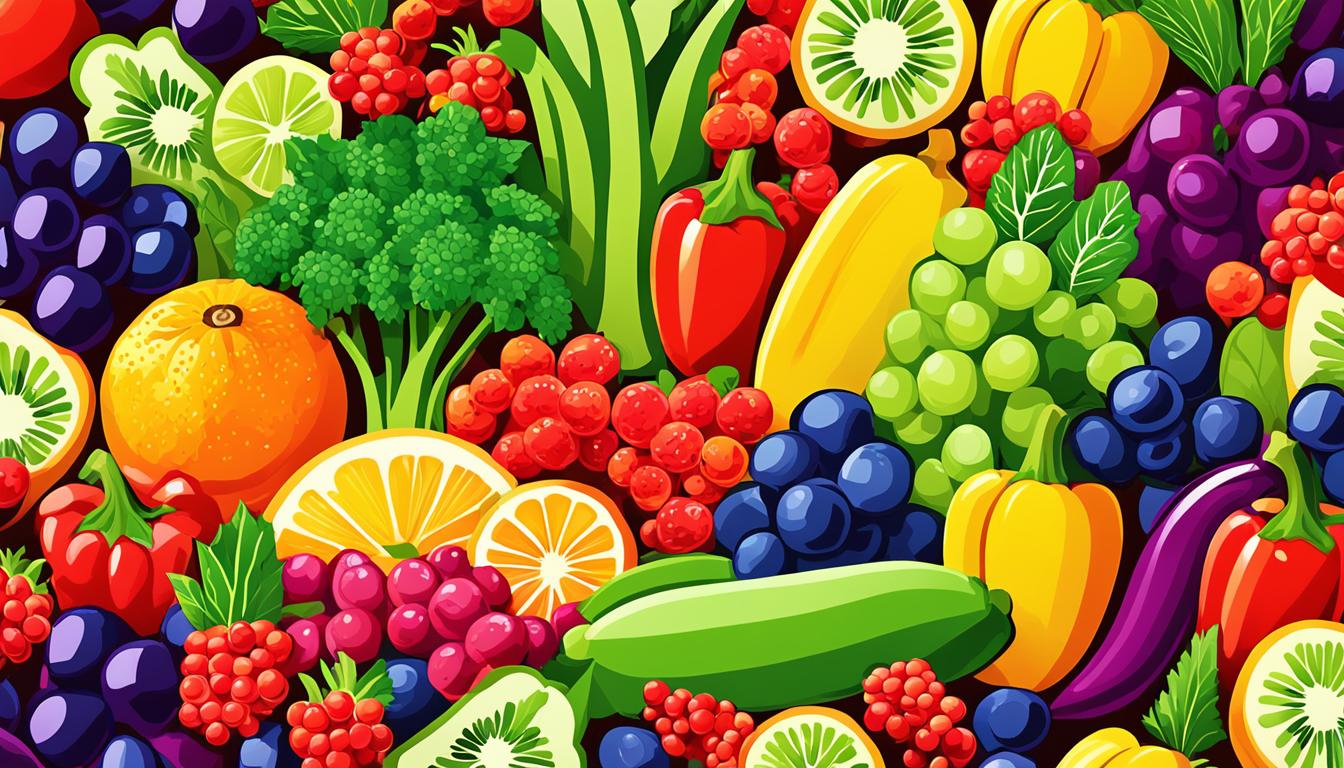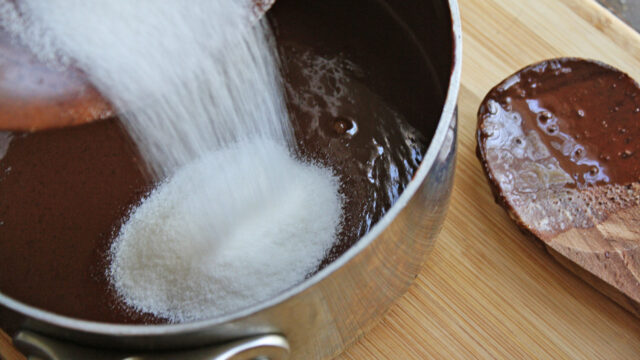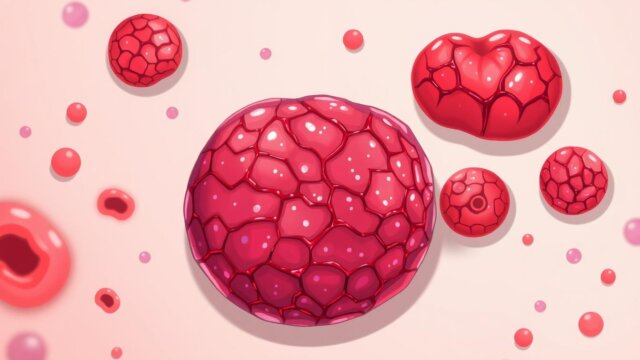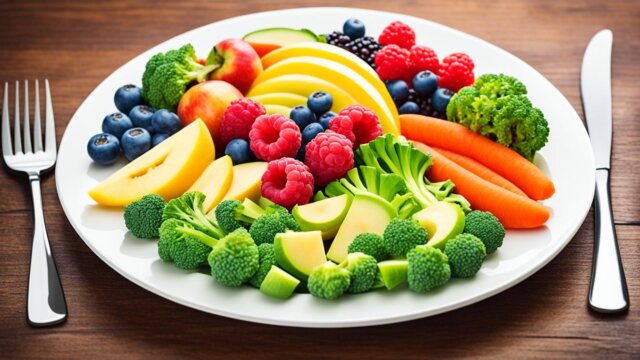FTC disclaimer: This post may contains affiliate links and we will be compensated if you click on a link and make a purchase.
A big 15 percent of people in the West face gut issues like IBS. But, there’s tasty food out there that can make our digestion better and reduce bloating.
Take bananas, for instance. They are fruits shaped like pears and are full of potassium. Potassium keeps our sodium levels in check and lessens bloating by managing water retention. Bananas also bring good gut bacteria, which reduces gas in our bellies.
Celery makes us less bloated too. It’s mostly water and has flavonoids that fight gut inflammation. Turmeric, on the other hand, contains curcumin. Curcumin eases IBS symptoms like bloating and discomfort. Plus, peppermint tea and capsules can make our stomach muscles less tight. This helps gas move through easier.
Key Takeaways
- Bananas are packed with potassium to manage sodium levels and reduce water retention, plus they contain gut-friendly bacteria.
- Celery provides hydration and anti-inflammatory flavonoids to soothe the gut.
- Turmeric’s curcumin can help alleviate IBS symptoms like bloating and discomfort.
- Peppermint tea and capsules relax the digestive system to allow gas to pass more easily.
- Fiber-rich foods, probiotics, and hydration are key for improving digestion and reducing bloating.
Foods that Aid in Digestion and Reduce Bloating
Certain foods really help with digestion and lessen bloating. According to the first and second sources, foods rich in fiber, probiotics, and those that are fermented help a lot. Also, eating hydrating foods is key to feeling better and bloating less.
Fiber-rich Foods
Adding more fiber to your meals can solve a lot of tummy troubles. For example, pineapples are good with 1.4 grams of fiber in a serving. Lentils are also high in fiber plus they have resistant starches. Oats have something special called beta-glucan that fights colitis.
Berries, like blackberries, are full of fiber too. They have almost 8 grams in a cup which helps with constipation and bloating. Asparagus is another fiber hero with a bonus of inulin. It supports steady digestion and fights off bloating and constipation.
Probiotics and Fermented Foods
Probiotics are good bacteria that are a must for a healthy gut. Yogurt is a star because it’s full of these helpful guys. It boosts the number of times you go to the bathroom and how smooth it is, which reduces bloating and swelling.
Kombucha, a fermented tea, is also good for the gut and fights bloating. Foods like sauerkraut, kimchi, and kefir are other fun ways to get probiotics. They make digestion easier and bloat less.
Hydrating Foods
Drinking enough water is key to avoid bloating. Cucumbers are almost all water, so they stop your body from holding onto too much water. This reduces bloating from being dry.
Celery has mannitol that makes poop softer and draws water into your tummy. It’s also a diuretic, helping your body get rid of extra water and salt. This eases bloating. Rhubarb is a natural helper that gets you to go to the bathroom.
It adds more fiber to your diet, also stopping bloating. Herbal teas, like ginger and peppermint, not only hydrate but also help your stomach in many ways.
9 Types of Foods Good for Digestion and Bloating Relief
Fermented foods like yogurt, kimchi, and sauerkraut are powerhouses for gut health. Ginger and peppermint are often overlooked but highly effective natural remedies for digestive issues.
Cruciferous vegetables like broccoli or Brussels sprouts might have once been seen as culprits for gas; however, when cooked properly or fermented like kimchi, they offer both fiber and essential nutrients without discomfort.
Fruits like papaya and pineapple are not just sweet treats but potent aids in digestion. Moreover, the prebiotic fiber in bananas fosters beneficial bacterial growth, creating a harmonious environment that’s likely to cut down on bloating
Incorporate plenty of whole grains like oatmeal or quinoa into your diet—they’re rich in insoluble fiber which pushes food through the gut efficiently while feeding healthy bacteria in the intestine.
Additionally, replacing processed foods with whole ones reduces instances of unnecessary additives causing bloating or gas buildup.
Lastly, staying well-hydrated complements any dietary changes you make; water aids every step of digestion from breaking down food to nutrient absorption—leading to a happier stomach overall.
Bananas: A Potassium-Packed Superfood
Bananas are not just tasty; they are good for you. These fruits are full of potassium, which is great for your health. Potassium helps your body use less sodium and fight off bloating.
Bananas Contain Beneficial Gut Bacteria
Research says, bananas can make your belly feel better. They have special good bacteria that might lower bloating. There was a study where women ate a banana before meals. They felt less bloated than those who didn’t.
Rich in Fiber and Potassium
Bananas are a top source of potassium. They also offer 3 grams of fiber. This makes them a healthy and satisfying snack. They can even help lower your blood pressure.
With 29 grams of carbs and tons of gut-friendly nutrients, bananas are perfect. They’re easy to take anywhere. Plus, they help with digestion and keep bloating at bay.
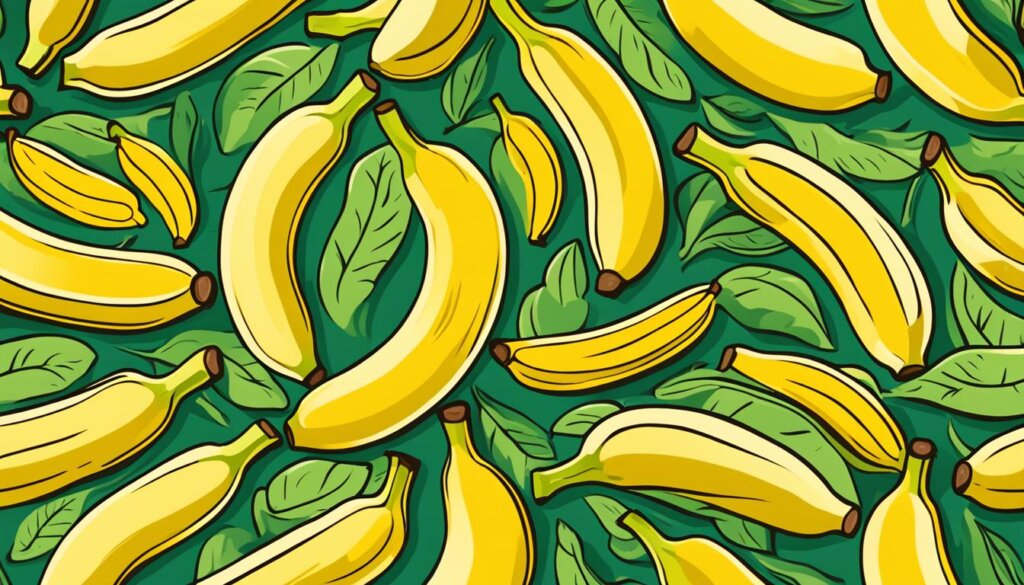
Ginger: A Natural Remedy for Digestive Woes
Ginger is a great spice for your stomach. It makes your gut juices flow better, helping with digestion. This means your stomach can empty faster, preventing bloating. Research also shows ginger speeds up stomach emptying. This prevents bloating and feelings of fullness.
Gingerol, found in ginger root, helps your stomach work well. It also makes digestion move smoothly. Plus, ginger can decrease nausea from chemo and morning sickness without medicine.
Ginger has over 400 natural compounds. It can reduce bloating, gas, and constipation. Some of its compounds fight swelling too, helping with arthritis and breathing issues.
Using ginger in your food is smart, say the experts. You can store fresh ginger in the fridge. or freeze it after chopping. Ginger paste can also be stored for two months. They also say it’s better to get ginger from food and drinks. This way, you know what you’re getting, and it’s good quality.
But be careful with too much ginger in supplements. It might cause more bleeding and lower blood sugar, risky for those on blood thinners or with diabetes.
Peppermint: Soothing for the Stomach
Peppermint is great for easing stomach issues. It can ease bloating. Studies say peppermint can help calm your gut. This lets gas move out easier, making your tummy feel less swollen.
A common way to use peppermint is through capsules. For adults and kids 12 and over, the usual is 1 or 2 capsules. You should take them three times a day.
Peppermint Tea for Relief
Prefer something natural? Peppermint tea is an option. It has the same calming abilities on the gut. Menthol in peppermint is known to relax the stomach muscles. This can cut down on gas and bloating. But, remember to space out peppermint oil and upset stomach medicine by 2 hours.
Peppermint Oil and IBS
Got IBS problems? Peppermint oil might help. It has worked for about 75% of IBS patients in studies. What works well is peppermint oil in enteric-coated capsules. They can bring down belly swelling, the number of trips to the bathroom, and gas for those who take them. Just know, it might take 1 to 2 weeks for peppermint oil to really improve your symptoms.
Using peppermint oil for stomach health is good. But, talking to your doctor first is wise. This is especially important if you’re on any meds or have health problems already.
Pregnant? Normally, avoid peppermint oil unless your doctor says to use it. Peppermint oil mixed with other herbs or supplements might have unknown effects.

Papaya: A Tropical Treat for Digestive Health
Papaya is a bright, pear-shaped fruit from the tropics. It’s tasty and helps with your digestion. Studies show it can ease problems like constipation and bloating. In one study from 2013, people who took papaya felt less bloated and constipated than those who didn’t.
Papaya’s Digestive Enzyme: Papain
Papain is a special enzyme in papaya. It makes digestion easier, especially of proteins. Papain helps with constipation and bloating, too. Also, papaya has carotenoids. These can lower inflammation, which is good for digestion.
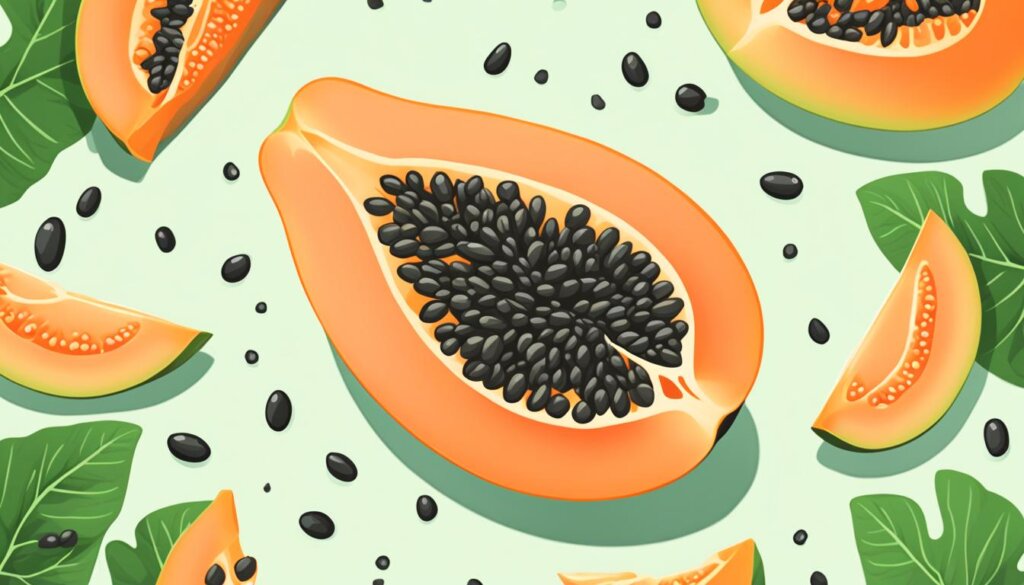
Papaya does more than just help with digestion. A small one (152 grams) has lots of good stuff. This includes Vitamins C and A, fiber, protein, and others. It’s great for your health in many ways.
Adding papaya to your meals can make a big difference. You can eat it in many ways. Try it in smoothies, salsas, or as dessert. This makes papaya a smart choice for staying healthy.
Probiotic and Fiber-rich Foods
Focusing on fiber-rich foods and probiotic-rich foods helps a lot with digestion and bloating. These help keep you regular and support your gut’s health.
Fiber-rich Foods for Regularity
Eating fiber-rich foods can make you go more regularly and reduce bloating. Lentils are full of fiber and are great for your gut. Oats have beta-glucan. It can ease colitis and lower colon inflammation.
Probiotic-Rich Foods for Gut Health
Having probiotic-rich foods is also good for your digestive system. Probiotics, the “good” bacteria, keep your gut balanced. Foods with vitamin A, like spinach, can add more good bacteria to your gut.
Yogurt is a powerful probiotic option. It helps make your stools regular and eases bloating and stomach swelling.
Eating fiber-rich foods and having probiotic-rich foods is a natural way to better your digestive health. It also reduces uncomfortable bloating issues.
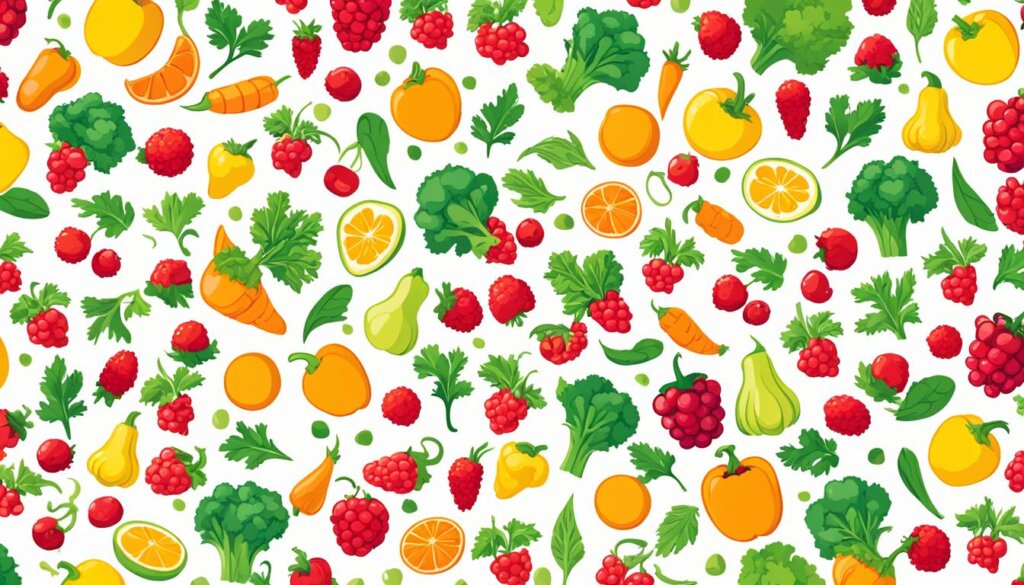
Fennel: A Licorice-Flavored Remedy
Fennel has a unique smell and taste like licorice. It’s great for easing tummy troubles and lessening how bloated you feel. Adding this plant to your meals can help with stomach issues.
Fennel’s Antispasmodic Properties
Fennel works well to fight bloating because of its antispasmodic traits. It has elements that calm the gut muscles. This lets gas move along easier and cuts down on the cramps that come with bloating. Your stomach feels better because of this.
But there’s more to fennel than just that. It’s full of fiber, vitamins, and minerals. This makes it good for keeping your whole digestive system happy. A cup of raw fennel has only 27 calories and 3 grams of fiber. It gives you a lot of the good stuff your body needs.
And let’s not forget about fennel seeds. They’re packed with fiber and other good things. A spoonful of dried fennel seeds has only 20 calories but 2 grams of fiber. It’s also full of important vitamins and minerals.
You can use fennel in many different recipes, like soups and salads. It also goes great with roasted veggies and in teas. With fennel, you’ve got a great natural way to help your digestion and fight bloating.
Yogurt: A Probiotic Powerhouse
Yogurt is full of probiotics. It’s great for your gut health and helps fight bloating. It’s rich in good bacteria, which is important for a healthy gut.
Yogurt for Digestive Issues
The probiotics in yogurt can make your stomach happier. They improve how often you go to the bathroom and make things more regular. Plus, they can help with bloating and irritable bowel syndrome (IBS).
Studies show that eating yogurt cuts down on colds. It may even lower your chance of getting heart disease.
Choosing the Right Yogurt
Pick yogurts that are loaded with probiotics. Greek yogurt is good for you and may help with weight loss.
If you have trouble with milk, be careful. You might not digest the sugar in yogurt well. It could cause stomach problems for some people.
Adding probiotic yogurt to your meals is a smart move. It can make your tummy feel better and cut down on bloating. Plus, it helps with many gut issues.
Hydrating Foods for Bloating Relief
It’s key to stay hydrated to fight off bloating and keep your digestion healthy. Try eating hydrating foods like water-rich fruits and veggies and drinking herbal teas. They help your body hold onto less water and make your tummy feel better.
Water-Rich Fruits and Veggies
Some water-rich fruits and veggies really help with bloating. Cucumbers, for example, are almost all water. They keep you hydrated and reduce bloating. Avocados are packed with potassium, which keeps fluid balance in check to avoid bloating. And blackberries are loaded with fiber, making it easier on your gut and helping against constipation and bloating.
Pineapple is also very hydrating and has bromelain, an enzyme that fights inflammation. Apples are full of fiber and pectin. They keep your gut healthy and ease food digestion to lessen bloating.
Herbal Teas and Infusions
Drinking herbal teas can soothe bloating. Peppermint tea can lower inflammation and bloating signs, great for IBS. Ginger tea is well-known to help with bloating and digestive issues too. Fennel can calm your gut muscles, easing gas and bloating.
Adding hydrating foods, water-rich fruits and veggies, and herbal teas to your meals can fight bloating and boost your digestive health.
Conclusion
Many foods help digestion and fight off bloating. They keep things moving, reduce swelling, and make your gut happy. Things like lentils, broccoli, and oats are great because they have a lot of fiber.
They also have things called resistant starches that your gut likes. Yogurt has good bacteria that helps your stomach work better. Eating food with lots of water, like fruits and herbal teas, also helps with bloating. This is because it balances your fluids out.
Ginger, peppermint, and fennel can calm your tummy and make bloating go away. Ginger makes your stomach empty faster, stopping bloating. Mint makes your stomach muscles calm down, which lets gas move through easier. Fennel’s seeds can stop you from feeling gassy and bloated, thanks to how they work on your stomach.
Bananas and papaya are also great for your stomach. Bananas have a lot of potassium. This helps your body handle salt and water better, cutting down on bloating. Papaya has an enzyme called papain. It might make it easier for you to go to the bathroom and reduce bloating. Adding these foods to what you eat can help your stomach and make you feel better.
FAQ
What foods can help with digestion and reduce bloating?
Fiber-rich foods, probiotics, and hydrating fruits and vegetables aid digestion. They help reduce bloating. Herbal teas are also beneficial for digestion.
How do bananas help with digestion and bloating?
Bananas contain potassium, which helps manage sodium and water in the body. This reduces bloating. They also contain good bacteria for the gut.
What are the benefits of ginger for digestion and bloating?
Ginger aids digestion by moving things along in the gut. It helps the stomach empty faster which prevents bloating. Ginger can also reduce feelings of fullness.
How can peppermint help with digestive issues and bloating?
Peppermint relaxes the digestive system, helping gas to move through. This eases stomach bloat and discomfort.
What are the digestive benefits of papaya?
Papaya is a natural remedy for digestion problems. Studies show it can reduce constipation and bloating. Participants who took papaya had fewer issues than the placebo group.
How can fennel help with gas and bloating?
Fennel relaxes the intestinal muscles. It helps decrease gas and bloating discomfort.
What are the benefits of yogurt for digestion and bloating?
Yogurt is rich in probiotics, which are good for the gut. They can reduce bloating. Probiotics improve stool health and reduce symptoms of IBS.
How can hydrating foods help with bloating?
Water in fruits, veggies, and herbal teas aids digestion. It helps in preventing bloating by removing excess sodium. Hydrating foods also keep you regular.
